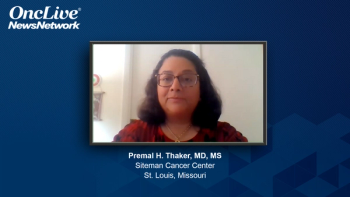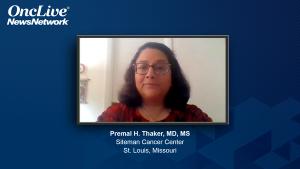
Leading experts across oncology specialties preview the key studies and data they are most anticipating ahead of the 2025 ESMO Congress.

Your AI-Trained Oncology Knowledge Connection!


Premal H. Thaker, MD,MS is the David G. and Lynn Mutch Distinguished Professor of Obstetrics and Gynecology; Director, Gynecological Oncology Clinical Research; Interim Chief, Division of Gynecologic Oncology.

Leading experts across oncology specialties preview the key studies and data they are most anticipating ahead of the 2025 ESMO Congress.

Premal H. Thaker, MD, MS, discusses data from a study of IMN-001 plus neoadjuvant chemotherapy in newly diagnosed epithelial ovarian cancer.

Premal H. Thaker, MD, MS, discusses the safety of intraperitoneal administration of IMNN-001 plus neoadjuvant chemotherapy in epithelial ovarian cancer.

Premal H. Thaker, MD, discusses safety and efficacy data for IMNN-001 plus neoadjuvant chemotherapy in newly diagnosed ovarian cancer.

Dr Thaker discusses the rationale for combining relacorilant with nab-paclitaxel in platinum-resistant ovarian cancer, and the future of the ROSELLA trial.

Panelists discuss recent data on emerging antibody-drug conjugates in advanced and recurrent endometrial cancer, including anti-TROP2 agents like sacituzumab govitecan from the TROPiCS-03 trial, datopotamab deruxtecan from TROPION-PanTumor03, and sacituzumab tirumotecan, as well as anti–folate receptor agents like luveltamab tazevibulin and rinatabart sesutecan, while offering future perspectives and closing thoughts on the evolving role of these agents in the treatment landscape for endometrial cancer.

Panelists discuss the recent tumor-agnostic approval of trastuzumab deruxtecan (T-DXd) based on findings from the DESTINY-PanTumor02 trial, exploring its implications for treatment approaches in advanced endometrial cancer, how to integrate T-DXd into treatment algorithms, patient selection criteria, and which patients are most likely to benefit from this therapy compared to lenvatinib/pembrolizumab.

Panelists discuss emerging data from ongoing trials evaluating innovative combination strategies for endometrial cancer, including insights from the LEAP trial (pembrolizumab + lenvatinib) and the KEYNOTE-B21 trial (pembrolizumab + chemotherapy with or without radiotherapy). They also address treatment considerations for patients with sentinel lymph node–positive disease.

Premal Thaker, MD, MS, discusses the role of the glucocorticoid receptor pathway and the development of chemoresistance in ovarian cancer.

Panelists discuss recent updates from the DUO-E trial, highlighting key efficacy and safety data that led to the FDA’s approval of durvalumab for endometrial cancer while examining how this new indication influences treatment strategies for advanced or recurrent cases.

Panelists review available treatment options for recurrent endometrial cancer, discussing their typical treatment approaches and the factors influencing treatment selection. Panelists also address insights from the RUBY trial, its updates, and the expanded FDA indication for dostarlimab, including the implications of these developments on treatment strategies and the potential benefits and challenges of broader use in patients.

Panelists discuss their approach to biomarker testing in advanced endometrial cancer, including the timing and types of testing performed, the specific biomarkers assessed (such as mismatch repair/microsatellite instability, POLE, and TP53), and how these results inform treatment decisions.

Panelists discuss the integration of tisotumab vedotin into ovarian cancer therapy, covering its role in treatment approaches, patient selection, adverse event management, clinical pearls, challenges in practice, and the implications of the drug’s payload on treatment efficacy.

Panelists discuss key findings from the KEYNOTE-A18 trial, which evaluated pembrolizumab in combination with chemoradiotherapy for high-risk locally advanced cervical cancer, highlighting the implications for treatment approaches in this patient population.

Panelists discuss recent data on various antibody-drug conjugates (ADCs) in ovarian cancer, including mirvetuximab soravtansine from trials like FORWARD II, MIRASOL, and PICCOLO; luveltamab tazevibulin and rinatabart sesutecan from STRO-002-GM1 and REFRαME-O1; and raludotatug deruxtecan from REJOICE-Ovarian01, highlighting the evolving role of these agents in the treatment landscape for ovarian cancer.

Panelists discuss the recent tumor-agnostic approval of trastuzumab deruxtecan (T-DXd) based on findings from the DESTINY-PanTumor02 trial, its potential impact on treating advanced ovarian cancer given HER2 data, and how T-DXd may fit into the current treatment algorithm for ovarian cancer.

Panelists discuss strategies to address PARP inhibitor (PARPi) resistance in ovarian cancer, including emerging combinations like gotistobart + pembrolizumab from the PRESERVE-004 trial, insights from the SOPRANO trial on managing oligometastases or oligoprogression, and approaches to mitigate or manage common adverse events associated with PARPi maintenance therapy.

Panelists discuss how emerging maintenance strategies for advanced/metastatic disease increasingly focus on novel combination approaches, including immunotherapy combinations with PARP inhibitors (rucaparib + nivolumab), anti-angiogenic agents (atezolizumab + bevacizumab), and dual targeted therapy (olaparib + cediranib), with ongoing evaluation of optimal patient selection and sequencing in the treatment paradigm.

Panelists explore emerging combination therapies in maintenance treatment for advanced ovarian cancer, including rucaparib + nivolumab; atezolizumab + bevacizumab; and olaparib + cediranib, also discussing how these strategies fit into the current treatment paradigm and in which patient populations they may be considered.

Panelists discuss optimal durations for PARP inhibitor maintenance therapy in ovarian cancer, exploring how long patients are typically kept on PARPi in both first-line and second-line maintenance settings.

Panelists discuss frontline maintenance therapies for advanced ovarian cancer, focusing on the impact of BRCA and HRD statuses on treatment selection and the choice between combination therapy (PARPi + bev) and monotherapy.

Premal Thaker, MD, MS, discusses the phase 3 RAMP-301 trial of avutometinib plus defactinib in recurrent low-grade serous ovarian cancer.

Expert oncologist Premal Thaker, MD, MS, reviews the current treatment landscape for recurrent low-grade serous ovarian cancer and considers the respective roles of various targeted agents in this setting.

Closing out their discussion on the management of cervical cancer, panelists share their excitement for future evolutions in care.

Experts share their experience and thoughts on the use of tisotumab vedotin as the management of metastatic cervical cancer continues to evolve.

Premal Thaker, MD, MS, discusses the importance of surveying patients on unmet needs in ovarian cancer.

Considerations for adverse event management with tisotumab vedotin use in patients with metastatic cervical cancer.

Shared insight on the approval of tisotumab vedotin, an antibody-drug conjugate, in the second-line setting of metastatic cervical cancer.

Panelists reflect on the potential for immune checkpoint inhibition to become a frontline option in metastatic cervical cancer, and what that means for the second-line setting.

An overview of second-line immune checkpoint inhibitor use in patients with relapsed or refractory metastatic cervical cancer.

Published: October 21st 2024 | Updated:

Published: October 21st 2024 | Updated:

Published: October 27th 2023 | Updated:

Published: October 14th 2024 | Updated:

Published: October 14th 2024 | Updated:

Published: October 28th 2024 | Updated: